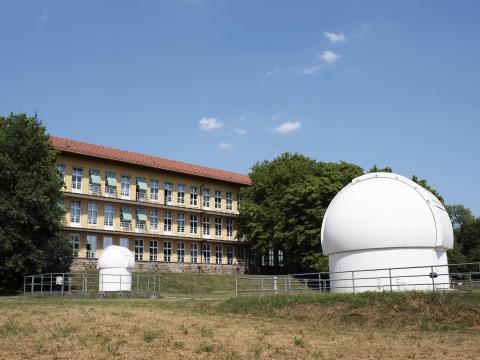Eberhard-Karls-Universität Tübingen - Physikalisches Institut - Kepler Center for Astro and Particle Physics
Institute

Eberhard-Karls-Universität Tübingen
Auf der Morgenstelle 14
D-72076 Tübingen
+49 7071 29-76297

Eberhard-Karls-Universität Tübingen
Auf der Morgenstelle 14
D-72076 Tübingen
+49 7071 29-76297
The particle physics group at the Institute of Physics is working on experiments for the search of physics beyond the standard model and investigating the role of elementary particles in cosmology, concentrating on the neutrino and its properties.
The experimental research on neutrinos emcompasses neutrino oscillations, which are studied in the Double Chooz and JUNO experiments, the search for neutrinoless double beta decay with the GERDA experiment and the measurement of the neutrino mass in the ECHo project. The CRESST experiment is trying to detect the dark matter in our galaxy using cryogenic particle detectors. Important components of these experiments were developed and constructed in Tübingen.
Further groups at the Institute of Physics work in the fields of nuclear physics (study of nuclear force via proton and photon induced reactions), in solid state physics (superconductivity) and quantum optics (Bose-Einstein condensate).
The Kepler Center for Astro and Particle Physics brings together scientists from particle physics and astro physics, both in experiment and theory. Common colloquia and lectures offer the opportunity to focus on these subjects within the program of the 4-year Bachelor education in Tübingen.
Die Teilchenphysik am Physikalischen Institut beschäftigt sich mit Experimenten zur Suche nach Physik jenseits des Standardmodells und der Rolle von Elementarteilchen in der Kosmologie. Dabei stehen die Untersuchung des Neutrinos und seiner Eigenschaften stehen im Vordergrund.
Das Forschungsprogramm in der Neutrinophysik umfasst die genau Untersuchung der Neutrino-Oszillationen mit den Experimenten Double Chooz und JUNO, die Suche nach dem neutrinolosen doppelten Betazerfall mit GERDA und die Bestimmung der Neutrinomasse im ECHo-Experiment. Die Suche nach den Teilchen der Dunklen Materie im Universum wird im CRESST-Experiment vorangetrieben, wobei neuartige Tieftemperatur-Detektoren zum Einsatz kommen. Wesentliche Komponenten dieser Experimente sind in Tübingen entstanden.
Daneben sind am Physikalischen Institut auch Kernphysik (Untersuchung der Kernkräfte durch Proton- oder Photon-induzierten Reaktionen), Festkörperphysik(Supraleitung) und Quantenoptik (Bose Einstein Kondensate) vertreten.
Im Kepler Center für Astro- und Teilchenphysik sind die Wissenschaftler aus der Teilchenphysik und Astrophysik, jeweils in Experiment und Theorie zusammengeschlossen. Seminare und Vorlesungen, die gemeinsam von Astrophysikern und Teilchenphysikern durchgeführt werden, bieten attraktive Möglichkeiten der Vertiefung im vierjährigen Bachelor-Studiengang in Tübingen.

